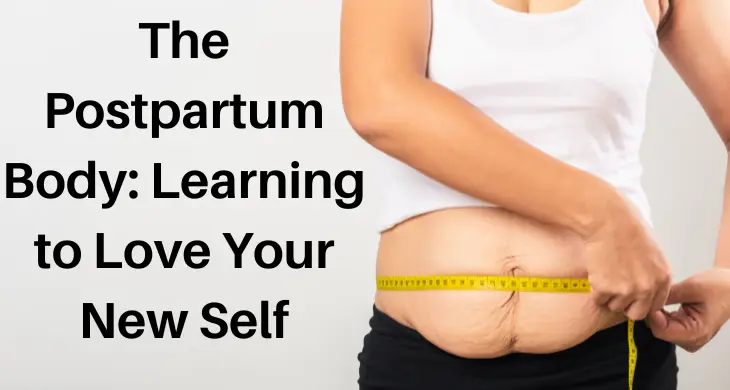Introduction
Bringing a new life into the world is a remarkable journey that transforms a woman both physically and emotionally. The postpartum period is a time of immense change, and embracing these changes can be a powerful step toward self-love and acceptance. In this article, we will explore the various aspects of the postpartum body, from understanding the changes to nurturing and celebrating your new self.
Understanding Postpartum Body Changes
Pregnancy and childbirth bring about significant physical changes in a woman’s body. These changes can include weight fluctuations, stretched abdominal muscles, sagging skin, and breast changes. Additionally, hormonal and emotional adjustments can impact a woman’s well-being during this time. It is important to recognize that these changes are natural and part of the incredible process of creating life.
Embracing Body Positivity
Societal beauty standards often place unrealistic expectations on women, particularly regarding their postpartum bodies. However, it is crucial to shift our focus from external judgments to self-acceptance and self-love. Embracing body positivity means celebrating the strength, resilience, and beauty of the postpartum body. Each stretch mark and scar tells a story of love and sacrifice.
Nurturing Your Body
Taking care of your body after giving birth is essential for your overall well-being. Prioritize self-care and rest, allowing yourself time to heal and recover. It is important to listen to your body and gradually reintroduce physical activity and exercise when you feel ready. Remember, this is not about “bouncing back” but rather about honoring your body’s unique journey.
Mental and Emotional Well-being
The postpartum period can bring about a range of emotions, and it’s important to prioritize your mental and emotional well-being. Practice self-compassion & positive self-talk, acknowledging the strength and resilience within you.
Dressing and Styling for Confidence
Choosing clothing that makes you feel comfortable and confident can have a significant impact on your self-image. Embrace your postpartum body by selecting flattering and functional pieces that accommodate your changing shape. Explore postpartum fashion options that prioritize both style and comfort and don’t forget to accessorize to add a personal touch to your outfits.
Building a Supportive CommunityConnecting with other new mothers who are experiencing similar postpartum challenges can provide invaluable support. Joining postpartum support groups or online communities allows you to share experiences, seek advice, and find encouragement. Building a supportive community can remind you that you are not alone and provide a safe space to navigate the postpartum journey.Celebrating Milestones and Progress
Acknowledge and celebrate every milestone and progress you make along your postpartum journey. Whether it’s regaining strength, achieving fitness goals, or simply finding moments of joy amidst the challenges, each step forward is worth celebrating. Set realistic goals and expectations, focusing on your overall well-being rather than solely on physical appearance.
Conclusion
The postpartum period is a transformative time when a woman’s body and identity undergo profound changes. By embracing and loving your postpartum body, you can embark on a journey of self-discovery and self-acceptance. Nurturing your body, prioritizing your mental and emotional well-being, and surrounding yourself with a supportive community are key to experiencing a positive & empowering postpartum experience. Remember, you are strong, resilient, and deserving of love and celebration.

Ques-How long does it take to fully recover from childbirth and regain my pre-pregnancy body?
Ans-The recovery period varies for each woman and depends on various factors,such as the type of delivery, overall health, and individual healing capacity. It is important to remember that the postpartum journey is unique for every woman, and there is no fixed timeline for regaining your pre-pregnancy body. Focus on self-care, listen to your body, and give yourself time to heal and adjust
Ques- Are there any exercises I can do to target specific areas affected by pregnancy, such as the abdomen and pelvic floor?
Ans-Yes, there are exercises that can help strengthen and tone specific areas affected by pregnancy. However, it is crucial to consult with a healthcare professional or a qualified postpartum fitness specialist before starting any exercise routine. They can guide you on safe and effective exercises that target the abdomen, pelvic floor, and other specific areas, taking into consideration any postpartum conditions or complications.
Ques- How can I cope with postpartum body image issues and societal pressures to”bounce back”?
Ans-Postpartum body image issues and societal pressures to “bounce back” can be challenging to navigate. It is important to prioritize your mental and emotional well-being by practicing self-compassion and surrounding yourself with a supportive community. Focus on embracing the changes in your body as a testament to the incredible journey of motherhood. Remember that your worth is not defined by your appearance, and celebrate the strength and beauty of your postpartum body.
Ques- Are there any clothing options specifically designed for postpartum bodies?
Ans-Yes, there are clothing options specifically designed for postpartum bodies that prioritize comfort, functionality, and style. Look for pieces that offer easy access for breastfeeding, provide support for your changing shape, and accommodate any postpartum concerns you may have. Maternity and nursing clothing lines often offer a wide range of options, including tops, dresses, & bottoms designed with postpartum needs in mind.
Ques- How can I seek professional help if I’m experiencing postpartum depression or anxiety?
Ans-It’s crucial to get expert assistance if you’re suffering from postpartum depression or anxiety. Reach out to your healthcare provider or a mental health professional who specializes in postpartum mental health. They can provide guidance, support, and appropriate treatment options, which may include therapy, counseling, or medication. Remember, seeking help is a sign of strength, and you deserve the support and care to navigate this challenging time.

